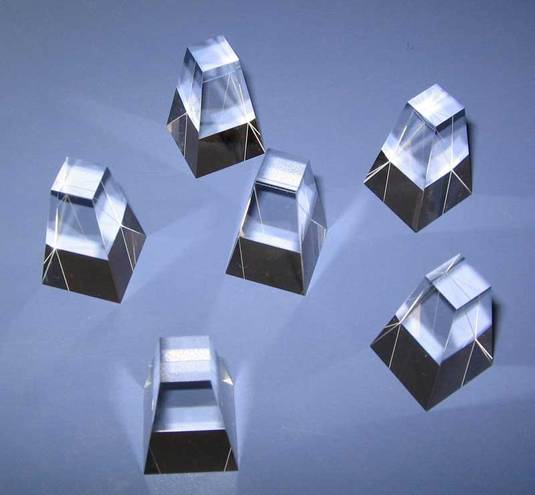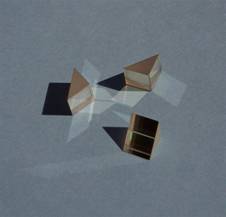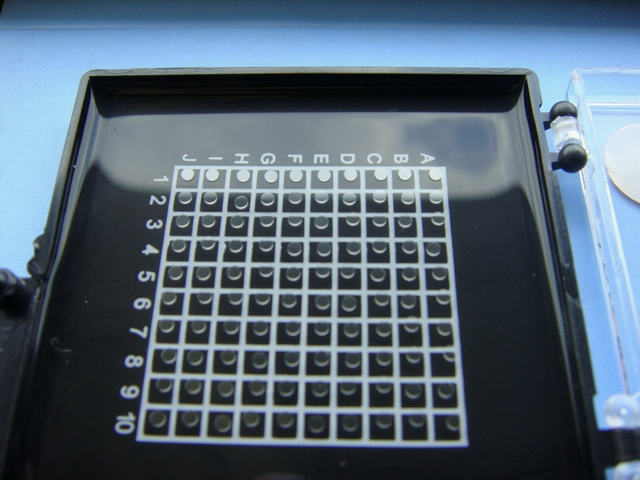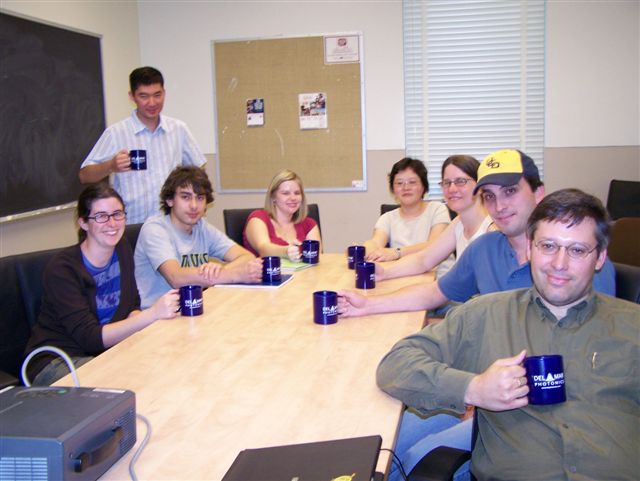Del Mar Photonics - Greyhawkoptics - Newsletter
BaF2 windows in FTIR
BaF2 windows are used in FTIR spectroscopy of cartilage and bone tissues.
FTIR spectroscopy provides information about biochemical
composition of the tissues. BaF2 is IR transparent; and tissue sections are
sliced onto these windows.
| Model | Product Name+ | Buy Now |
| WG-BaF2-25.4-10-1.55 | BaF2 wedge, 25.4 mm x 10.0 mm x 1.55 mm |
|
| WG-BaF2-25.4-10-2.1 | BaF2 wedge, 25.4 mm x 10.0 mm x 2.1 mm |
|
| W-BaF2-12.7-2 | BaF2 window, ø 12.7 mm x 2.0 mm |
|
| W-BaF2-4-0.5 | BaF2 window, ø 4" x 0.5", polished, uncoated |
|
| PCX-BaF2-25.4-25 | IR Barium Fluoride Plano-Convex Lens, ø 1", f = 25 mm |
|
| PCX-BaF2-25.4-50 | IR Barium Fluoride Plano-Convex Lens, ø 1", f = 50 mm |
|
| PCX-BaF2-25.4-75 | IR Barium Fluoride Plano-Convex Lens, ø 1", f = 75 mm |
|
| PCX-BaF2-25.4-100 | IR Barium Fluoride Plano-Convex Lens, ø 1", f = 100 mm |
|
| PCX-BaF2-25.4-200 | IR Barium Fluoride Plano-Convex Lens, ø 1", f = 200 mm |
|
| PCX-BaF2-50.8-100 | IR Barium Fluoride Plano-Convex Lens, ø 2", f = 100 mm |
|
| PCX-BaF2-50.8-200 | IR Barium Fluoride Plano-Convex Lens, ø 2", f = 200 mm |
|
Examples of FTIR spectroscopy publications where BaF2 windows are used:
Candida antarctica lipase B catalyzed polymerization of lactones: Effects of
immobilization matrices on polymerization kinetics & molecular weight
Industrial Biotechnology, Jun 2005, Vol. 1, No. 2 : 126 -134
Takahiko Nakaoki
NSF Center for Biocatalysis & Bioprocessing of Macromolecules, Polytechnic
University, Department of Chemistry and Chemical Engineering, Six Metrotech
Center, Brooklyn, New York 11201, USA.
Ying Mei
NSF Center for Biocatalysis & Bioprocessing of Macromolecules, Polytechnic
University, Department of Chemistry and Chemical Engineering, Six Metrotech
Center, Brooklyn, New York 11201, USA.
Lisa M. Miller
National Synchrotron Light Source, Brookhaven National Laboratory, Upton, New
York 11973. USA.
Ajay Kumar
NSF Center for Biocatalysis & Bioprocessing of Macromolecules, Polytechnic
University, Department of Chemistry and Chemical Engineering, Six Metrotech
Center, Brooklyn, New York 11201, USA.
Bhanu Kalra
NSF Center for Biocatalysis & Bioprocessing of Macromolecules, Polytechnic
University, Department of Chemistry and Chemical Engineering, Six Metrotech
Center, Brooklyn, New York 11201, USA.
M. Elizabeth Miller
Rohm and Haas Company, PO Box 904, Spring House, Pennsylvania19477, USA.
Ole Kirk
Research & Development, Novozymes A/S, Krogshoejvej 36, DK-2880 Bagsvaerd,
Denmark.
Morten Christensen
Research & Development, Novozymes A/S, Krogshoejvej 36, DK-2880 Bagsvaerd,
Denmark.
Richard A. Gross
NSF Center for Biocatalysis & Bioprocessing of Macromolecules, Polytechnic
University, Department of Chemistry and Chemical Engineering, Six Metrotech
Center, Brooklyn, New York 11201, USA.
This study investigated the effect of enzyme immobilization on its activity for
the ring-opening polymerizations of lactones with differing ring sizes. Candida
antarctica lipase B (CALB) was immobilized on a wide array of support materials
that varied in polymer composition, relative hydrophobicity, pore diameter, and
surface area. The reaction rates and polymer molecular weights were monitored by
in situ NMR measurements. Synchrotron infrared microspectroscopy (SIRMS) was
used to study the enzyme distribution and secondary structure within the support
matrix. The fastest reaction rates resulted by immobilization of CALB on the
macroporous matrices QDM 2-3-4 and Accurel. Both of these are constructed from
polypropylene and had CALB distributed throughout the matrix particles.
Immobilized CALB on QDM 2-3-4 gave ε-caprolactone (ε-CL) conversion that reached
50 and 95% in 12 and 60 min, respectively. In comparison, by using CALB
immobilized on Deloxan HAP, a 50% CL conversion required 120 h. Other changes
that were found by immobilization of CALB on different matrices are shifts in
CALB selectivity and the frequency of step-condensation reactions at monomer
conversions >50%. By changing the immobilization matrix, PCL molecular weight
was increased from 5,000 to 15,000. All of the CALB-matrix systems investigated
in this study gave polymerizations with ε-CL conversions that followed a
first-order rate law. Changes in CALB catalytic activity and specificity imply
variations in CALB conformation induced by the different surfaces. However,
these conformational changes must be subtle since they were not found by
synchrotron IR Microspectroscopy. Two common features observed that led to CALB-matrix
systems with higher activity for polyester synthesis are: i) increased density
of CALB molecules within the pores of matrices, and ii) distribution of CALB
throughout the matrix.
Del Mar Photonics featured components
Del Mar Photonics continuously expands its components portfolio.
 |
Solar
Prisms for Concentrating Photovoltaic Systems (CPV) Solar cells made of compound semiconductors such as gallium arsenide are very expensive. Usually very small cells are installed and various means such as mirrors, lenses, prisms, etc..are used to concentrate sunlight on the cells. Concentration photovoltaic technology (CPV) uses the solar radiation with an efficiency of 40%, double that of conventional solar cells Del Mar Photonics design custom Concentrating Photovoltaic Systems (CPV) and supply variety of the optical components for CPV such as solar prisms shown in the picture. hexagonal light pipes, optical rods High Concentration Photovoltaic Panel (HCPV) - request for information Solar Glass reflectors & optics for solar power generation & solar heating Ultrafast studies of charge carrier dynamics in nanomaterials and relevance to solar energy conversion CdTe Solar Cells |
|
|
Axicon Lens Axicon lens also known as conical lens or rotationally symmetric prism is widely used in different scientific research and application. Axicon can be used to convert a parallel laser beam into a ring, to create a non diffractive Bessel beam or to focus a parallel beam into long focus depth. Del Mar Photonics supplies axicons with cone angles range from 130° to 179.5° for use with virtually any laser radiation. We manufacture and supply axicons made from BK7 glass, fused silica and other materials. download brochure - request a quote |
 |
Rutile (TiO2) coupling
prisms Del Mar Photonics offers optical elements made of high quality synthetically grown Rutile Titanium Dioxide crystals. Rutile’s strong birefringency, wide transmission range and good mechanical properties make it suitable for fabrication of polarizing cubes, prisms and optical isolators. Boules having high optical transmission and homogeneity are grown by proprietary method. Typical boules have 10 - 15 mm in dia. and up to 25 mm length. Optical elements sizes - from 2 x 2 x 1 mm to 12.7 x 12.7 x 12.7 mm. Laser grade polish quality is available for finished elements. So far we the largest elements that we manufactured are 12 x15 x 5 mm, in which optical axis is parallel to 15 mm edge, 5 mm is along beam path, 12 x 15 mm faces polished 20/10 S/D, one wave flatness, parallelism < 3 arc.min. (better specs. available on request). more details - download brochure - request a quote - properties incl. refractive index - buy online Cylindrical and hemispherical lenses from rutile TiO2 Rutile retroreflectors - PBS Rutile windows TiO2 single crystal - quote - TiO2-5-5-20 TiO2 single crystal AR 700-900 nm - TiO2-5-5-20 TiO2 single crystal AR 1500-1700 nm Rutile prisms in production: Brewster angle rutile (TiO2) prism - applications |
|
|
Lithium Tantalate (LiTaO3) Lithium Tantalate exhibits unique electro-optical, pyroelectric and piezoelectric properties combined with good mechanical and chemical stability and , wide transparency range and high optical damage threshold. This makes LiTaO3 well-suited for numerous applications including electro-optical modulators, pyroelectric detectors, optical waveguide and SAW substrates, piezoelectric transducers etc. LiTaO3 wafer SAW grade - Lithium Tantalate, LiTaO3 - crystal - elements for pyroelectric detector - EOM - EO crystal - wafers - Lithium Tantalate Substrates for Pyroelectric Detectors - y-cut LiTaO3 - LiTaO3 properties - Electro – Optic Pockels Cells - Optical Waveguide Substrates - Pyroelectric Detector Substrates - Piezoelectric Transducers - wafers- Lithium Tantalate frequency filter - detector - Lithium Tantalate wafers and crystals - LiTaO3 thin substrates - cylindrical z-cut LiTaO3 crystal - online store |
 |
Sapphire components Sapphire Circular Windows - Square & Rectangle - Rods Sapphire & Ruby Rings - Sapphire & Ruby Balls - Sapphire & Ruby Nozzles Sapphire Lenses - Ball & Seat - Special Products - Sapphire Vee & Cup Jewels Sapphire Ceramics - Ceramic Sleeves - Ceramic Holes - Ceramic Rods Sapphire & Ruby Orifices - Sapphire & Ruby Tubes - Sapphire Components Sapphire Half Round Rod - Sapphire Windows - Rods & Tubes - Special Part Sapphire Prism - 5x5x5 - Sapphire Chisel - Sapphire Square Rod Generation of white-light continuum Sapphire rods for HPLC: Agilent Technologies - Beckman Coulter, Inc. - Cecil Instruments - Dionex Corp - Hitachi, Ltd. - PerkinElmer, Inc. - Shimadzu Scientific Instruments - Thermo Fisher Scientific - Varian, Inc. - Waters Corporation |
|
|
Vacuum viewport Del Mar Photonics offer a range of competitively priced UHV viewports , Conflat, ISO or KF including a variety of coatings to enhance performance. Del Mar Photonics viewports are manufactured using advanced techniques for control of special and critical processes, including 100 percent helium leak testing and x-ray measurements for metallization control. Windows Materials include: Fused silica, Quartz , Sapphire , MgF2, BaF2, CaF2, ZnSe, ZnS, Ge, Si, Pyrex. Standard Viewing diameters from .55" to 1.94 ". Coating - a range of custom coatings can applied - which include - Single QWOT - Broad Band AR - V coatings - ITO - DLC (Diamond like coating) more details - request a quote - High-Vacuum System for High Power Lasers - AR Coated Zinc Selenide Vacuum Viewport |
|
|
Zinc Selenide optical components |
|
|
NARROW-BAND HOLOGRAPHIC FILTERS are intended for suppression of powerful beams in research and in engineering, in particular, in laser spectroscopy, and also for protection from blinding and damaging by laser radiation various photo receiver devices and operator's eyes. Unlike conventional interference filters, which are made by vacuum evaporation techniques, holographic filters are fabricated by recording interference patterns formed between two mutually coherent laser beams. Since all layers are recorded simultaneously within a thick stack, the optical density of the notch filter is high and its spectral bandwidth can be extremely narrow. Also, since the layering profile is sinusoidal instead of square wave, holographic notch filters are free from extraneous reflection bands and provide significantly higher laser damage thresholds.
|
 |
We are looking forward to hear from you and help you with your optical and crystal components requirements. Need time to think about it? Drop us a line and we'll send you beautiful Del Mar Photonics mug (or two) so you can have a tea party with your colleagues and discuss your potential needs. |

Del Mar Photonics, Inc.
4119 Twilight Ridge
San Diego, CA 92130
tel: (858) 876-3133
fax: (858) 630-2376
Skype: delmarphotonics
sales@dmphotonics.com